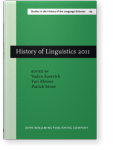De la fusion des langues au repli sur soi (URSS 1917–1953)
It is known that in the USSR two very different ideological and political atmospheres followed each other: after the internationalist period of the years just after the Revolution, with its dream of disappearance of borders, a new one emerged from the end of the 1920s, which was characterized by an isolationist and nationalist withdrawal during which time USSR was compared to a besieged fortress. This paper aims to analyze the presence of these two periods of Soviet history in the linguistic texts, focusing mainly on the typical characteristics of language for each period. At the end, through the analysis of linguistic texts and their conception of language, two different images of Soviet Union will appear, reflecting the ideological and political ideals of each of these two periods.
Article language: French
